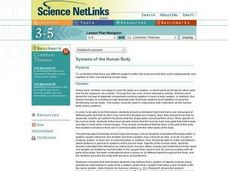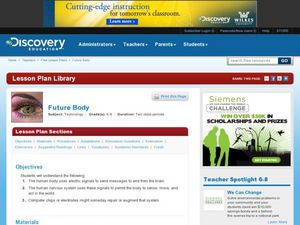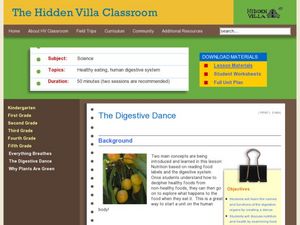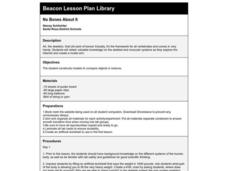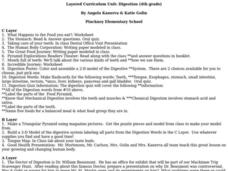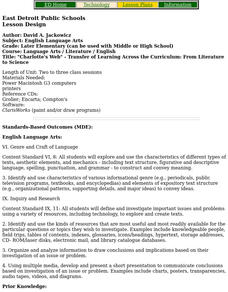Curated OER
Animals and Humans
Young scholars identify the functions of various body parts. They participate in the "Head, Shoulders, Knees, and Toes" song, draw a picture of themselves and other mammals, and create a traced outline of their body that they add...
Curated OER
My Body
First Graders practice using the names of body parts by finding pictures and placing them in the correct position on a life-size outline of a human body. These type of hands-on lessons are one of the best ways for young learners to truly...
Curated OER
Body Parts in Spanish
Students use Spanish to recognize and recall body parts. In this Spanish anatomy lesson, students identify and name the parts of the body in Spanish. Students describe a person physically by his hair and color of eyes. Students graph...
Curated OER
Biology: Systems of the Human Body
Students examine the different systems of the human body and how they work independently and cooperatively. They complete sevral online interactive projects designed to reinforce how the systems work alone and together. Students make...
A Mighty Girl
Maria da Penha
A colorful poster introduces class members to Maria da Penha. A biopharmacist and activist, Penha was influential in writing and getting passed, Brazil's first domestic violence law which bears her name.
Curated OER
From Human Skeletons to Owl Pellets to Paleontology
Students explore about the function of the skeleton and comprehend the names of the bones of the human skeleton. They compare bones of the human skeleton to a dinosaur skeleton and graph to compare these bones. Students sort bones to...
Curated OER
Body Systems
In this body systems lesson, students work in small groups conduct research to become an 'expert' on one of the 7 body systems. Students present their findings to the class via power point, poster, or song.
Curated OER
Hermit Crabs Lifecycle & Stages
Students review the life cycle of land hermit crabs by viewing a poster or transparency. They identify the different body parts of a hermit crab and what each part is used for.
Curated OER
Skeletal System And External Body Development Of A Full Term Fetus
Students explore the skeletal system and external body development of a full term fetus. In this biology lesson plan, students learn that growth of a full-term fetus' skeletal system and external body parts become more detailed and...
Curated OER
All's Well for Stem Cells
By exploring the latest research on cell and tissue renewal your young scientists can understand the various internal body parts and systems examined in these studies.
Curated OER
Future Body
Young scholars explain the benefits of cyborg augmentation. In this technology lesson plan, students research how the nervous system works. They create posters and present them to class.
Curated OER
Circulatory Circles
Students investigate the circulatory system. In this circulatory system lesson, students complete a WebQuest and explore all the areas of the heart. Students determine the functions of different parts of the circulatory system and...
Curated OER
Healthy Heart
Students discover the power of their heart and provide an opportunity to talk about ways to maintain good health. In this early childhood heart lesson, students diagram a human heart, identify exercises that promote a healthy heart, and...
Curated OER
The Digestive Dance
Students read food labels to compare healthy verses non healthy food and then use diagrams to create a poster of the digestive system. In this food lesson plan, students move the food down the digestive track along the digestive system.
Curated OER
Kirk Medical School
Fifth graders conduct research on the major organ systems of the human body. They create and present 3D models of a body system, and collect basic first-aid supplies for donation to a third-world community.
BBC
Ourselves
Young biologists identify parts of the body, sort humans from other animals, and list the difference they see. Learners are split up into groups of three, and each group must find pictures in magazines of humans and other animals. They...
Curated OER
The Skeletal System
Young scholars research the skeletal system. In this anatomy lesson, students measure their bodies to find the approximate length of their bones. They draw and cut out each of the bones and then attach them using brads or glue.
Curated OER
No Bones About It
Young scholars conduct Internet research on the different parts of the skeletal system. Then they create a model arm that demonstrates how muscle and bone work together to create movement.
Curated OER
Digestion
Fourth graders answer the question what happens to the food you eat? They complete a worksheet about the food you eat. They discuss the different types of teeth that we have. Students complete digestion poster in which they color and...
Curated OER
Digestion & Nutrition: a Case Study
Students explore digestion/nutrition and utilize scientific investigation skills. They complete meal logs for several days and graph their results. After analyzing their data, they write formal lab reports.
Curated OER
Feed Me, Seymour
Students work in small groups to create posters illustrating the major facts and functions of plant organs. Within their groups, they assume the role of specialists creating specialized posters pertaining to the different parts of plants.
Curated OER
Regulation of Human Heart Rate
In this regulation of the human heart rate worksheet, students learn to measure their heart rate and design an experiment to test for the affects of a stimulus on the heart rate.
Curated OER
"Charlotte's Web" - Transfer of Learning Across the Curriculum: From Literature to Science
Students research and write about the parts of a spider's body using educational software. They draw spiders using computer software.
Curated OER
Case Study Two: Shark Dissection
Students read an article on sharks prior to beginning a dissection lab. As part of the lab, students identify differences between the shark anatomy and human anatomy and hypothesize why those differences exist.



